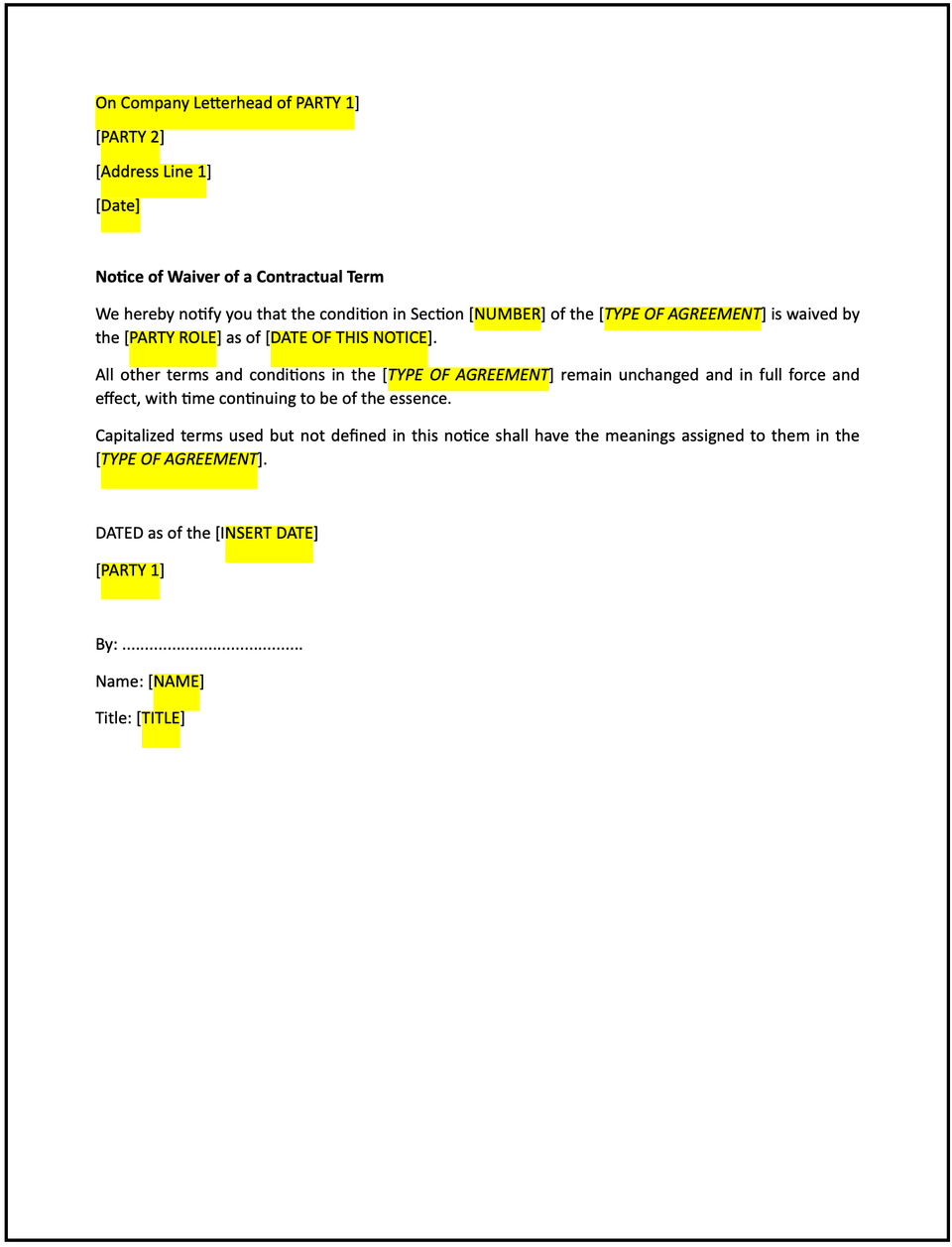Letter of waiver of a contractual term: Free template

Letter of waiver of a contractual term
A waiver of a contractual term allows one party to voluntarily relinquish a specific right or obligation under the agreement without voiding the entire contract. This letter provides a professional way to confirm the waiver, outline its scope, and specify any conditions or limitations to maintain clarity and alignment between parties.
How to use this letter of waiver of a contractual term
- Reference the contract: Clearly identify the contract, including its title, reference number, and the parties involved. Specify the term or clause being waived.
- Specify the waiver: Clearly state the term being waived, the scope of the waiver, and whether it is temporary or permanent.
- Explain the rationale: Provide a concise explanation of why the waiver is being granted, ensuring it aligns with the contract’s context.
- Clarify limitations: Specify any conditions, limitations, or boundaries of the waiver to prevent misunderstandings.
- Maintain a professional tone: Ensure the letter is respectful, factual, and focused on maintaining the business relationship.
- Request acknowledgment: Ask the other party to confirm receipt of the letter and agree to the waiver’s terms, if required.
Benefits of using a letter of waiver of a contractual term
This letter template ensures a professional and transparent way to confirm the waiver of a contractual term while maintaining clarity and accountability. Here’s how it helps:
- Provide clarity: Clearly defining the waived term and its scope ensures both parties understand the implications and limitations.
- Promote transparency: The letter demonstrates openness and fosters trust by documenting the waiver.
- Preserve the contract: By waiving a specific term rather than renegotiating the entire agreement, the letter maintains the integrity of the contract.
- Minimize disputes: Documenting the waiver prevents misunderstandings or disagreements about the term in the future.
- Facilitate collaboration: The letter reinforces a cooperative relationship by addressing contractual flexibility constructively.
Tips for writing an effective letter of waiver of a contractual term
- Be specific: Clearly identify the contract and the term being waived, including relevant clause numbers or titles.
- Clarify the scope: Define whether the waiver is limited (e.g., temporary or for specific circumstances) or permanent.
- Use professional language: Maintain a respectful and factual tone to ensure the letter reflects professionalism.
- Address limitations: Include any conditions or boundaries to ensure the waiver is not misinterpreted.
- Keep it concise: Focus on the key points and avoid unnecessary details or commentary.
Frequently asked questions (FAQs)
Q: What details should I include in this letter?
A: Include the contract reference, the specific term being waived, the scope of the waiver, and any conditions or limitations.
Q: Is a waiver legally binding?
A: Yes, a waiver is binding if both parties agree to it and it is documented properly. It does not typically void the rest of the contract.
Q: Who typically receives this letter?
A: Send the letter to the other party or parties involved in the contract, typically their legal or operational representatives.
Q: How formal should this letter be?
A: The tone should be professional and respectful, reflecting the importance of maintaining clarity and alignment.
Q: When should this letter be sent?
A: Send the letter promptly after the waiver decision is made to ensure all parties are informed and aligned.
Q: Can a waiver be revoked?
A: It depends on the terms of the waiver. If it is temporary or conditional, revocation might be possible under certain circumstances.
Q: Does this letter affect the rest of the contract?
A: No, the waiver applies only to the specified term and does not invalidate the rest of the contract unless explicitly stated.
This article contains general legal information and does not contain legal advice. Cobrief is not a law firm or a substitute for an attorney or law firm. The law is complex and changes often. For legal advice, please ask a lawyer.


